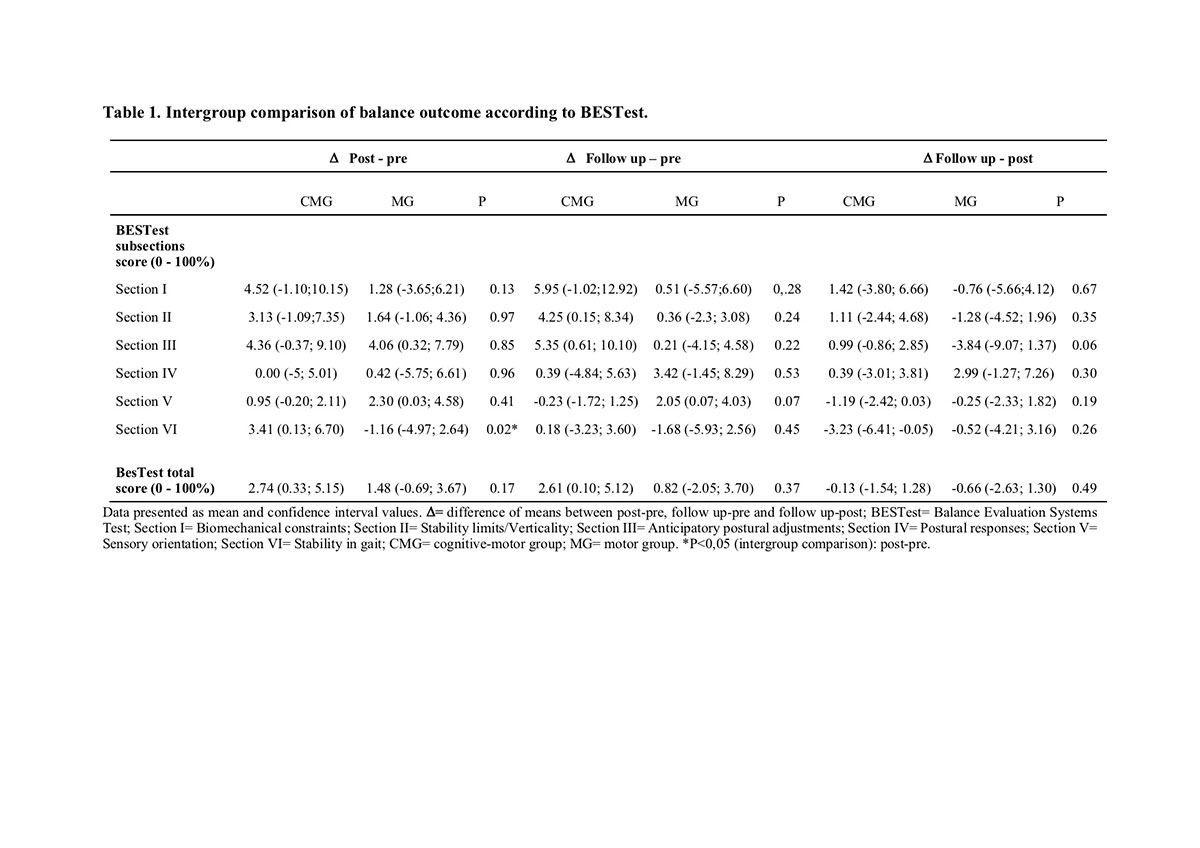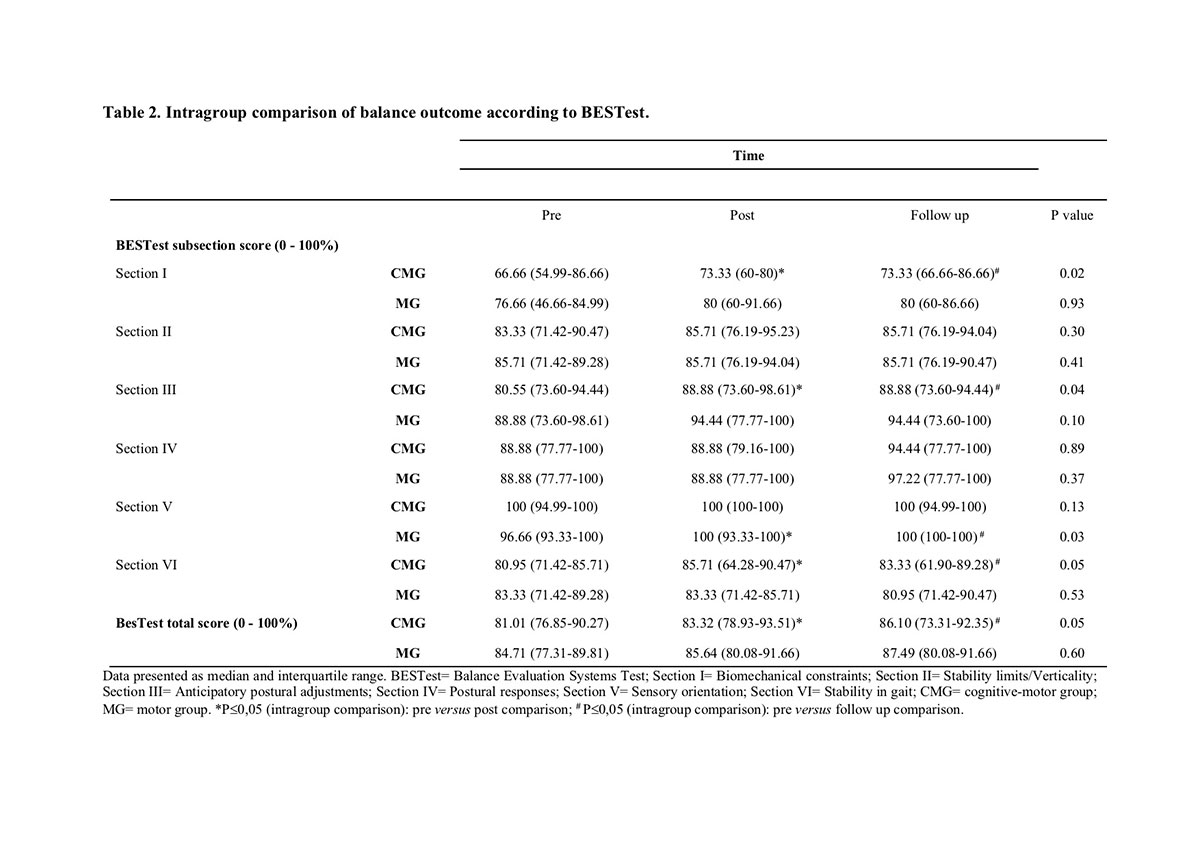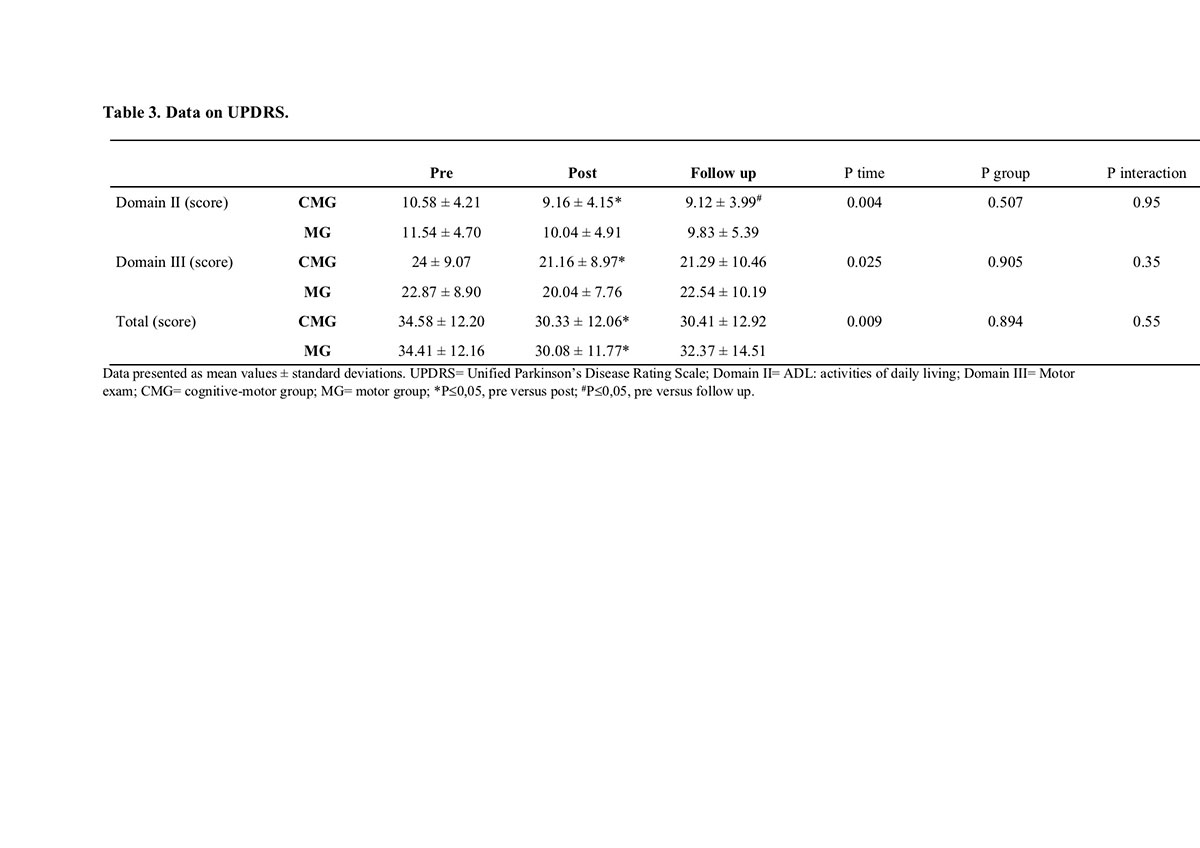Session Information
Date: Monday, September 23, 2019
Session Title: Physical and Occupational Therapy
Session Time: 1:45pm-3:15pm
Location: Les Muses Terrace, Level 3
Objective: To verify the effectiveness of adding cognitive training to motor physiotherapy compared to motor physiotherapy in balance, motor symptoms and activities of daily living in individuals with Parkinson’s disease (PD); to investigate the effectiveness of both treatments after a 3-month follow-up, on balance, motor symptoms and activities of daily living.
Background: Balance is multimodal and requires the integration of several systems, so it is considered proactive, adaptive and based on prior experiences [1-3].Associations have been reported between postural instability with global cognitive functionandexecutive function [4-6].Regarding the best treatment recommendation, however, the results available in the literature still remain divergent: they point to beneficial effects for balance either in essentially motor therapies or in cognitive-motor therapies, both in individuals with PD and in healthy elderly individuals [7-12].
Method: Randomized clinical trial, where the individuals were randomized into two groups: Motor Group (MG; n=29) executed balance training; Cognitive-Motor Group (CMG; n=29), balance training plus cognitive training at the end of the therapy. Evaluation instruments: Balance Evaluation Systems Test(BESTest); Unified Parkinson Disease Rating Scale (UPDRS).
Results: In the intergroup comparison, a difference was found in stability of gait using BESTest, in favor of CMG [table1]. In the BESTest, in the time effect: a difference was found for CMG in biomechanical constraints (pre vs. post; pre vs. follow-up), anticipatory postural adjustments (pre vs. post; pre vs. follow-up), stability of gait (pre vs. post; pre vs. follow-up) and total score (pre vs. post; pre vs. follow-up); for MG, in sensory orientation (pre vs. post; pre vs. follow-up) [table2]. In the UPDRS, the following were found: significant differences for CMG, in activities of daily living domain (pre vs. post and pre vs. follow-up), motor domain (pre vs. post) and total score (pre vs. post); for MG, difference in the total score (pre vs. post) [table3].
Conclusion: Cognitive-motor treatment was not superior to motor treatment in individuals with PD. Considering the time effect, both groups improved balance and motor symptoms.
References: 1. Horak, F.B., Wrisley, D.M., Frank J. The Balance Evaluation Systems Test (BESTest) to Differentiate Balance Deficits. Phys Ther. 89(5):484-498 (2009). 2. Kafri, M., Hutzler, Y., Korsensky, O., & Laufer Y. Functional Performance and Balance in the. J Geriatr Phys Ther. 1-2. 3 (2017). Fino, P.C., Peterka, R.J., Hullar, T.E., et al. Assessment and rehabilitation of central sensory impairments for balance in mTBI using auditory biofeedback : a randomized clinical trial. 1-14 (2017). 4. Kelly, V.E., Johnson, C.O., McGough, E.L., et al. Association of cognitive domains with postural instability/gait disturbance in Parkinson’s disease. Park Relat Disord. 21(7):692-697 (2015). 5. Aarsland, D., Creese, B., Politis, M., et al. Cognitive decline in Parkinson disease. Nat Rev Neurol (2017). 6. Williams-Gray, C.H., Foltynie, T., Brayne, C.E.G., Robbins, T.W., Barker, R.A. Evolution of cognitive dysfunction in an incident Parkinson’s disease cohort. Brain. 130(7):1787-1798 (2007). 7. Conradsson, D., Löfgren, N., Nero, H., et al. The Effects of Highly Challenging Balance Training in Elderly With Parkinson’s Disease. Neurorehabil Neural Repair. 29(9):827-836 (2015). 8. Pompeu, J.E., Mendes, F.A. dos S., Silva, K.G. da, et al. Effect of Nintendo WiiTM-based motor and cognitive training on activities of daily living in patients with Parkinson’s disease: A randomised clinical trial. Physiotherapy. 98(3):196-204 (2012). 9. Santos, S.M., Da Silva, R.A., Terra, M.B., Almeida, I.A., De Melo, L.B., Ferraz, H.B. Balance versus resistance training on postural control in patients with Parkinson’s disease: A randomized controlled trial. Eur J Phys Rehabil Med. 53(2) (2017). 10. Wong-Yu, I.S.K., Mak, M.K.Y. Multi-dimensional balance training programme improves balance and gait performance in people with Parkinson’s disease: A pragmatic randomized controlled trial with 12-month follow-up. Park Relat Disord. 21(6):615-621 (2015). 11. Monticone, M., Ambrosini, E., Laurini, A., Rocca, B., Foti, C. In-patient multidisciplinary rehabilitation for Parkinson’s disease: A randomized controlled trial. Mov Disord. 30(8):1050-1058 (2015). 12. Hagovska, M., Takac, P., Dzvoník, O. Effect of a combining cognitive and balanced training on the cognitive postural and functional status of seniors with a mild cognitive deficit in a randomized, controlled trial. Eur J Phys Rehabil Med. 56(1):27-38 (2015).
To cite this abstract in AMA style:
M. Terra, N. Barboza, I. de Almeida, M. Bueno, S. Smaili. Does cognitive-motor training improve the balance in Parkinson’s disease? Randomized clinical trial [abstract]. Mov Disord. 2019; 34 (suppl 2). https://www.mdsabstracts.org/abstract/does-cognitive-motor-training-improve-the-balance-in-parkinsons-disease-randomized-clinical-trial/. Accessed February 3, 2026.« Back to 2019 International Congress
MDS Abstracts - https://www.mdsabstracts.org/abstract/does-cognitive-motor-training-improve-the-balance-in-parkinsons-disease-randomized-clinical-trial/



